#include "ftl_config.h"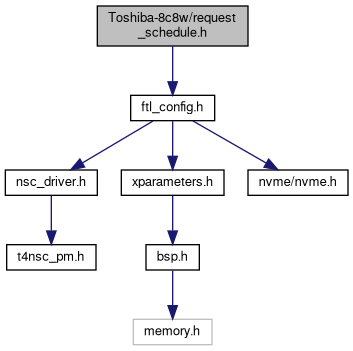

Go to the source code of this file.
Data Structures | |
| struct | _COMPLETE_FLAG_TABLE |
| struct | _STATUS_REPORT_TABLE |
| struct | _ERROR_INFO_TABLE |
| struct | _RETRY_LIMIT_TABLE |
| struct | _DIE_STATE_ENTRY |
| struct | _DIE_STATE_TABLE |
| The status table of each die on the flash memory. More... | |
| struct | _WAY_PRIORITY_ENTRY |
| The way priority table of this channel. More... | |
| struct | _WAY_PRIORITY_TABLE |
| The channel status table, each entry contains 7 lists. More... | |
Macros | |
| #define | WAY_NONE 0xF |
| #define | LUN_0_BASE_ADDR 0x00000000 |
| #define | LUN_1_BASE_ADDR 0x00100000 |
| #define | PSEUDO_BAD_BLOCK_MARK 0 |
| #define | RETRY_LIMIT 5 |
| The max number of times a request can retry if it failed. More... | |
| #define | DIE_STATE_IDLE 0 |
| #define | DIE_STATE_EXE 1 |
| #define | REQ_STATUS_CHECK_OPT_NONE 0 |
| #define | REQ_STATUS_CHECK_OPT_CHECK 1 |
| #define | REQ_STATUS_CHECK_OPT_REPORT 2 |
| #define | REQ_STATUS_CHECK_OPT_COMPLETION_FLAG 3 |
| #define | REQ_STATUS_RUNNING 0 |
| #define | REQ_STATUS_DONE 1 |
| #define | REQ_STATUS_FAIL 2 |
| #define | REQ_STATUS_WARNING 3 |
| #define | ERROR_INFO_FAIL 0 |
| #define | ERROR_INFO_PASS 1 |
| #define | ERROR_INFO_WARNING 2 |
Functions | |
| void | InitReqScheduler () |
| Initialize scheduling related tables. More... | |
| void | SyncAllLowLevelReqDone () |
| Do schedule until all the requests are done. More... | |
| void | SyncAvailFreeReq () |
| Try release request entries by doing scheduling (both NVMe and NAND). More... | |
| void | SyncReleaseEraseReq (unsigned int chNo, unsigned int wayNo, unsigned int blockNo) |
| Issuing requests until the specified block can be erased. More... | |
| void | SchedulingNandReq () |
Iteratively do schedule on each channel by calling SchedulingNandReqPerCh. More... | |
| void | SchedulingNandReqPerCh (unsigned int chNo) |
| The main function to schedule NAND requests on the specified channel. More... | |
| void | PutToNandWayPriorityTable (unsigned int reqSlotTag, unsigned int chNo, unsigned int wayNo) |
| Append the specified die to a NAND state list based on the request type of the given request. More... | |
| void | PutToNandIdleList (unsigned int chNo, unsigned int wayNo) |
| Append the specified die to the tail of the idle list of its channel. More... | |
| void | SelectivGetFromNandIdleList (unsigned int chNo, unsigned int wayNo) |
| Remove the specified die from the idle list of its channel. More... | |
| void | PutToNandStatusReportList (unsigned int chNo, unsigned int wayNo) |
| Append the specified die to the tail of the status report list of its channel. More... | |
| void | SelectivGetFromNandStatusReportList (unsigned int chNo, unsigned int wayNo) |
| Remove the specified die from the status report list of its channel. More... | |
| void | PutToNandReadTriggerList (unsigned int chNo, unsigned int wayNo) |
| Append the specified die to the tail of the read trigger list of its channel. More... | |
| void | SelectiveGetFromNandReadTriggerList (unsigned int chNo, unsigned int wayNo) |
| Remove the specified die from the read trigger list of its channel. More... | |
| void | PutToNandWriteList (unsigned int chNo, unsigned int wayNo) |
| Append the specified die to the tail of the write list of its channel. More... | |
| void | SelectiveGetFromNandWriteList (unsigned int chNo, unsigned int wayNo) |
| Remove the specified die from the write list of its channel. More... | |
| void | PutToNandReadTransferList (unsigned int chNo, unsigned int wayNo) |
| Append the specified die to the tail of the read transfer list of its channel. More... | |
| void | SelectiveGetFromNandReadTransferList (unsigned int chNo, unsigned int wayNo) |
| Remove the specified die from the read transfer list of its channel. More... | |
| void | PutToNandEraseList (unsigned int chNo, unsigned int wayNo) |
| Append the specified die to the tail of the erase list of its channel. More... | |
| void | SelectiveGetFromNandEraseList (unsigned int chNo, unsigned int wayNo) |
| Remove the specified die from the erase list of its channel. More... | |
| void | PutToNandStatusCheckList (unsigned int chNo, unsigned int wayNo) |
| Append the specified die to the tail of the status check list of its channel. More... | |
| void | SelectiveGetFromNandStatusCheckList (unsigned int chNo, unsigned int wayNo) |
| Remove the specified die from the status check list of its channel. More... | |
| void | IssueNandReq (unsigned int chNo, unsigned int wayNo) |
| Issue a flash operations to the storage controller. More... | |
| unsigned int | GenerateNandRowAddr (unsigned int reqSlotTag) |
| Get the nand row (block) address of the given request. More... | |
| unsigned int | GenerateDataBufAddr (unsigned int reqSlotTag) |
| Get the corresponding data buffer entry address of the given request. More... | |
| unsigned int | GenerateSpareDataBufAddr (unsigned int reqSlotTag) |
| Get the corresponding sparse data buffer entry address of the given request. More... | |
| unsigned int | CheckReqStatus (unsigned int chNo, unsigned int wayNo) |
| Update the die status and return the request status. More... | |
| unsigned int | CheckEccErrorInfo (unsigned int chNo, unsigned int wayNo) |
| void | ExecuteNandReq (unsigned int chNo, unsigned int wayNo, unsigned int reqStatus) |
| Update die state and issue new NAND requests if the die is in IDLE state. More... | |
Macro Definition Documentation
◆ DIE_STATE_EXE
| #define DIE_STATE_EXE 1 |
Definition at line 69 of file request_schedule.h.
◆ DIE_STATE_IDLE
| #define DIE_STATE_IDLE 0 |
Definition at line 68 of file request_schedule.h.
◆ ERROR_INFO_FAIL
| #define ERROR_INFO_FAIL 0 |
Definition at line 85 of file request_schedule.h.
◆ ERROR_INFO_PASS
| #define ERROR_INFO_PASS 1 |
Definition at line 86 of file request_schedule.h.
◆ ERROR_INFO_WARNING
| #define ERROR_INFO_WARNING 2 |
Definition at line 87 of file request_schedule.h.
◆ LUN_0_BASE_ADDR
| #define LUN_0_BASE_ADDR 0x00000000 |
Definition at line 54 of file request_schedule.h.
◆ LUN_1_BASE_ADDR
| #define LUN_1_BASE_ADDR 0x00100000 |
Definition at line 55 of file request_schedule.h.
◆ PSEUDO_BAD_BLOCK_MARK
| #define PSEUDO_BAD_BLOCK_MARK 0 |
Definition at line 57 of file request_schedule.h.
◆ REQ_STATUS_CHECK_OPT_CHECK
| #define REQ_STATUS_CHECK_OPT_CHECK 1 |
Definition at line 72 of file request_schedule.h.
◆ REQ_STATUS_CHECK_OPT_COMPLETION_FLAG
| #define REQ_STATUS_CHECK_OPT_COMPLETION_FLAG 3 |
Definition at line 74 of file request_schedule.h.
◆ REQ_STATUS_CHECK_OPT_NONE
| #define REQ_STATUS_CHECK_OPT_NONE 0 |
Definition at line 71 of file request_schedule.h.
◆ REQ_STATUS_CHECK_OPT_REPORT
| #define REQ_STATUS_CHECK_OPT_REPORT 2 |
Definition at line 73 of file request_schedule.h.
◆ REQ_STATUS_DONE
| #define REQ_STATUS_DONE 1 |
Definition at line 81 of file request_schedule.h.
◆ REQ_STATUS_FAIL
| #define REQ_STATUS_FAIL 2 |
Definition at line 82 of file request_schedule.h.
◆ REQ_STATUS_RUNNING
| #define REQ_STATUS_RUNNING 0 |
Definition at line 80 of file request_schedule.h.
◆ REQ_STATUS_WARNING
| #define REQ_STATUS_WARNING 3 |
Definition at line 83 of file request_schedule.h.
◆ RETRY_LIMIT
| #define RETRY_LIMIT 5 |
The max number of times a request can retry if it failed.
Each die has their own retry counter, which is managed by the RETRY_LIMIT_TABLE, if a request is done or reaching the max retry times, the corresponding counter will be reset to this value.
Definition at line 66 of file request_schedule.h.
◆ WAY_NONE
| #define WAY_NONE 0xF |
Definition at line 52 of file request_schedule.h.
Typedef Documentation
◆ COMPLETE_FLAG_TABLE
| typedef struct _COMPLETE_FLAG_TABLE COMPLETE_FLAG_TABLE |
◆ DIE_STATE_ENTRY
| typedef struct _DIE_STATE_ENTRY DIE_STATE_ENTRY |
like a node of doubly-linked list.
Each entry consist of 4 members:
- dieState
- reqStatusCheckOpt
- prevWay
- nextWay
In the beginning, the dieState of each way was initialized to IDLE and all the ways of this channel were connected in serial order.
◆ DIE_STATE_TABLE
| typedef struct _DIE_STATE_TABLE DIE_STATE_TABLE |
The status table of each die on the flash memory.
This table is simply a 2D status array of each way on each channel.
◆ ERROR_INFO_TABLE
| typedef struct _ERROR_INFO_TABLE ERROR_INFO_TABLE |
◆ P_COMPLETE_FLAG_TABLE
| typedef struct _COMPLETE_FLAG_TABLE * P_COMPLETE_FLAG_TABLE |
◆ P_DIE_STATE_ENTRY
| typedef struct _DIE_STATE_ENTRY * P_DIE_STATE_ENTRY |
◆ P_DIE_STATE_TABLE
| typedef struct _DIE_STATE_TABLE * P_DIE_STATE_TABLE |
◆ P_ERROR_INFO_TABLE
| typedef struct _ERROR_INFO_TABLE * P_ERROR_INFO_TABLE |
◆ P_RETRY_LIMIT_TABLE
| typedef struct _RETRY_LIMIT_TABLE * P_RETRY_LIMIT_TABLE |
◆ P_STATUS_REPORT_TABLE
| typedef struct _STATUS_REPORT_TABLE * P_STATUS_REPORT_TABLE |
◆ P_WAY_PRIORITY_ENTRY
| typedef struct _WAY_PRIORITY_ENTRY * P_WAY_PRIORITY_ENTRY |
◆ P_WAY_PRIORITY_TABLE
| typedef struct _WAY_PRIORITY_TABLE * P_WAY_PRIORITY_TABLE |
◆ RETRY_LIMIT_TABLE
| typedef struct _RETRY_LIMIT_TABLE RETRY_LIMIT_TABLE |
◆ STATUS_REPORT_TABLE
| typedef struct _STATUS_REPORT_TABLE STATUS_REPORT_TABLE |
◆ WAY_PRIORITY_ENTRY
| typedef struct _WAY_PRIORITY_ENTRY WAY_PRIORITY_ENTRY |
The way priority table of this channel.
This table manage several statuses:
- idle
- readTrigger
- readTransfer
- write
- erase
- statusReport
- statusCheck
Each status manage the serial number of head way and tail way,
At the initialization stage, the idle list contains all ways in the channel and the other lists are empty.
◆ WAY_PRIORITY_TABLE
| typedef struct _WAY_PRIORITY_TABLE WAY_PRIORITY_TABLE |
The channel status table, each entry contains 7 lists.
Function Documentation
◆ CheckEccErrorInfo()
| unsigned int CheckEccErrorInfo | ( | unsigned int | chNo, |
| unsigned int | wayNo | ||
| ) |
Definition at line 1321 of file request_schedule.c.

◆ CheckReqStatus()
| unsigned int CheckReqStatus | ( | unsigned int | chNo, |
| unsigned int | wayNo | ||
| ) |
Update the die status and return the request status.
- Note
- This function has a side effect: the flag
reqStatusCheckOptof this die may be updated fromREQ_STATUS_CHECK_OPT_CHECK, which means the first stage status check, toREQ_STATUS_CHECK_OPT_REPORT, which means the second stage status check, or changed fromREQ_STATUS_CHECK_OPT_REPORTtoREQ_STATUS_CHECK_OPT_CHECK, so this function should be used carefully.
- Parameters
-
chNo the target channel number to check the status. wayNo the target die number to check the status.
- Returns
- unsigned int the status of the request being executed on this die.
Definition at line 1257 of file request_schedule.c.
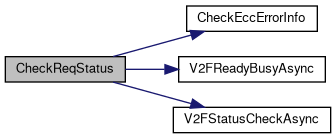

◆ ExecuteNandReq()
| void ExecuteNandReq | ( | unsigned int | chNo, |
| unsigned int | wayNo, | ||
| unsigned int | reqStatus | ||
| ) |
Update die state and issue new NAND requests if the die is in IDLE state.
If the die state is IDLE, we can just issue new NAND request on that die. But if the state is EXE, we should do different thing based on the request status:
previous request is RUNNING
Nothing to do, just wait for it.
previous request is DONE
Before we set the die state to IDLE, we need to do something based on its request type:
- if previous request is READ_TRIGGER, just convert to READ_TRANSFER
- otherwise, removed from the request queue and reset the retry count
- Note
- if a command should be split into some continuous requests, we should modify this to ensure other requests will not be executed before these requests finished. Take READ for example, if a READ_TRIGGER finished, the data is still in its die register, thus we should make sure the READ_TRANSFER to be the next request that will be executed on this die to prevent the die register from being overwritten.
previous request is FAIL
If the request failed, there are different things to do based on the request type. For READ_TRIGGER and READ_TRANSFER, retry the request (from READ_TRIGGER state) until reaching the retry limitation. For other requests, just mark as bad block.
previous request is WARNING
This means ECC failed, report bad block then make die IDLE and reset retry count
- Todo:
- bad block and ECC related handling
- Note
- in current implementation, this is the only function that changes the dieState.
- Parameters
-
chNo the channel number which should exec this request wayNo the way number which should exec this request reqStatus the status of the previous request executed on the specified die
Definition at line 1386 of file request_schedule.c.
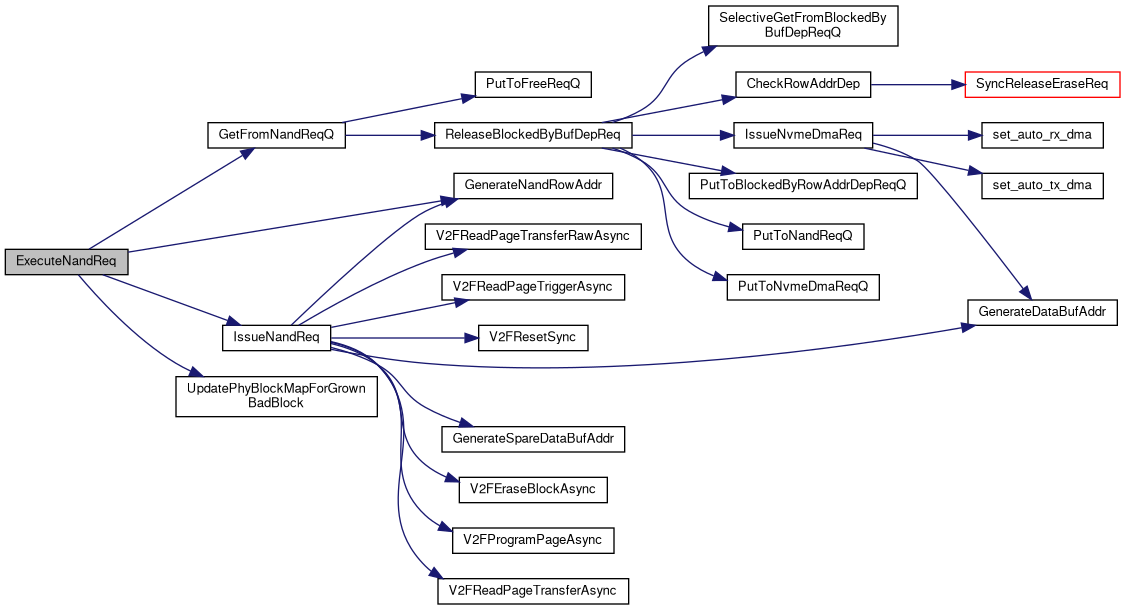

◆ GenerateDataBufAddr()
| unsigned int GenerateDataBufAddr | ( | unsigned int | reqSlotTag | ) |
Get the corresponding data buffer entry address of the given request.
Before issuing the DMA operations, we have to set the buffer address where the request should get/put their data during the READ/WRITE request.
To do this, we may have to specify the entry index of real data buffer and convert to the real address if the data buffer format not REQ_OPT_DATA_BUF_ADDR:
find the index of data buffer entry to be used:
Similar to the two request data buffer
dataBufandtempDataBuf, there are also two types of real data buffer specified by the two addressDATA_BUFFER_BASE_ADDRandTEMPORARY_DATA_BUFFER_BASE_ADDR.Since the two real data buffer have same number of entries with its corresponding request data buffer,
AVAILABLE_TEMPORARY_DATA_BUFFER_ENTRY_COUNTfor temp buffer andAVAILABLE_DATA_BUFFER_ENTRY_COUNTfor normal buffer, we can just simply use the index of the request data buffer entry to find the corresponding index of real data buffer entry.get the address of real data buffer entry:
Since the real data buffer entry have the same size with NAND page size, and we have already found the entry index, we can just multiply the index by the page size defined by
BYTES_PER_DATA_REGION_OF_SLICEto get the starting address of the corresponding data buffer of the given data buffer entry.However, if the request is a NVMe request, we should do some extra works. Since the unit size of NVMe block is 4K, which is one-fourth of the page size, if the LBA didn't align by 4, we have to move (N*4K) bytes within the real data buffer entry by using the offset to find the address corresponding to the NVMe block.
- Parameters
-
reqSlotTag the request data buffer entry index
- Returns
- unsigned int the address of real data buffer entry to be used
Definition at line 1169 of file request_schedule.c.

◆ GenerateNandRowAddr()
| unsigned int GenerateNandRowAddr | ( | unsigned int | reqSlotTag | ) |
Get the nand row (block) address of the given request.
To get the row address, we have first check if the nand address format is VSA or not. If the address is VSA, we should convert it to the physical address by doing address translation.
- Warning
- Toshiba NAND only have SLC mode?
- Parameters
-
reqSlotTag the request pool index of the target request.
- Returns
- unsigned int the nand row address for the target request.
Definition at line 1085 of file request_schedule.c.

◆ GenerateSpareDataBufAddr()
| unsigned int GenerateSpareDataBufAddr | ( | unsigned int | reqSlotTag | ) |
Get the corresponding sparse data buffer entry address of the given request.
Similar to GenerateDataBufAddr(), but with different buffer base address, different entry size (256B for metadata/sparse data) and no need to deal with the offset of NVMe requests.
- Note
- the
RESERVED_DATA_BUFFER_BASE_ADDRdidn't explicitly split into real data area and sparse data area, hence we should manually add 16K (page size) to get the area for sparse data.
- Parameters
-
reqSlotTag the request data buffer entry index
- Returns
- unsigned int the address of sparse data buffer entry to be used
Definition at line 1216 of file request_schedule.c.

◆ InitReqScheduler()
| void InitReqScheduler | ( | ) |
Initialize scheduling related tables.
The following tables may be used for scheduling:
dieStateTablePtr: contains the metadata of all dieswayPriorityTablePtr: manages the way state table of each channelcompleteFlagTablePtr:statusReportTablePtr:eccErrorInfoTablePtr:retryLimitTablePtr: manages the remain retry count of each die
In this function:
- all the ways of same channel are in the idle list of their channel.
- all the dies are in idle state and connected in serial order
- the completion count and status report of all die are set to 0
- the retry limit number of each die is set to
RETRY_LIMIT
Definition at line 83 of file request_schedule.c.

◆ IssueNandReq()
| void IssueNandReq | ( | unsigned int | chNo, |
| unsigned int | wayNo | ||
| ) |
Issue a flash operations to the storage controller.
To issue a NAND request, we should first allocate a data buffer entry for the request, though some request may not use the buffer, and then call the corresponding function defined in the nsc_driver.c based on the request type.
Before we issue the request, we should set the reqStatusCheckOpt flag of the specified die based on the request type:
- for READ_TRANSFER request, set to
REQ_STATUS_CHECK_OPT_COMPLETION_FLAG, which means the we should use the complete flag table to determine if this request is done. Beside checking the status, this flag also used for distinguishing between READ_TRANSFER and other flash operations, since the ECC result may need to be checked, check the functionCheckReqStatus()for details. - for RESET, SET_FEATURE request, set to
REQ_STATUS_CHECK_OPT_NONE, which means the request won't update the status table, and we can just use the busy/ready status to determine whether this request is done. - for READ_TRIGGER, WRITE, ERASE request, set to
REQ_STATUS_CHECK_OPT_CHECK, but this flag is a little bit complicated; this flag actually represent the first stage status check, and this flag may be updated to theREQ_STATUS_CHECK_OPT_REPORT, which is used to represent the second stage status check, if the functionCheckReqStatus()called during the scheduling process. CheckSchedulingNandReqPerCh()andCheckReqStatus()for details.
- Warning
- replace the condition statements with switch statement
- Parameters
-
chNo the channel number of the targe die to issue the NAND request. wayNo the way number of the targe die to issue the NAND request.
Definition at line 1013 of file request_schedule.c.
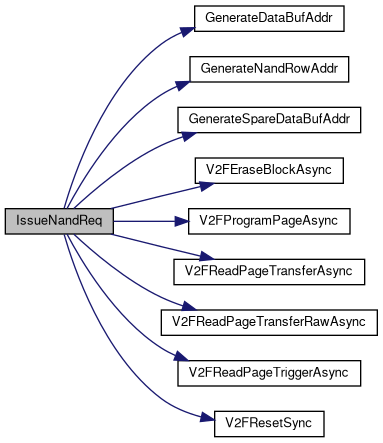

◆ PutToNandEraseList()
| void PutToNandEraseList | ( | unsigned int | chNo, |
| unsigned int | wayNo | ||
| ) |
Append the specified die to the tail of the erase list of its channel.
Similar to PutToNandIdleList() but with different target list.
- Parameters
-
chNo the channel number of target die wayNo the way number of target die
Definition at line 859 of file request_schedule.c.

◆ PutToNandIdleList()
| void PutToNandIdleList | ( | unsigned int | chNo, |
| unsigned int | wayNo | ||
| ) |
Append the specified die to the tail of the idle list of its channel.
- Note
- This function won't change the
reqStatusCheckOptanddieStateflags.
- Parameters
-
chNo the channel number of target die wayNo the way number of target die
Definition at line 536 of file request_schedule.c.

◆ PutToNandReadTransferList()
| void PutToNandReadTransferList | ( | unsigned int | chNo, |
| unsigned int | wayNo | ||
| ) |
Append the specified die to the tail of the read transfer list of its channel.
Similar to PutToNandIdleList() but with different target list.
- Parameters
-
chNo the channel number of target die wayNo the way number of target die
Definition at line 796 of file request_schedule.c.

◆ PutToNandReadTriggerList()
| void PutToNandReadTriggerList | ( | unsigned int | chNo, |
| unsigned int | wayNo | ||
| ) |
Append the specified die to the tail of the read trigger list of its channel.
Similar to PutToNandIdleList() but with different target list.
- Parameters
-
chNo the channel number of target die wayNo the way number of target die
Definition at line 670 of file request_schedule.c.

◆ PutToNandStatusCheckList()
| void PutToNandStatusCheckList | ( | unsigned int | chNo, |
| unsigned int | wayNo | ||
| ) |
Append the specified die to the tail of the status check list of its channel.
Similar to PutToNandIdleList() but with different target list.
- Parameters
-
chNo the channel number of target die wayNo the way number of target die
Definition at line 922 of file request_schedule.c.

◆ PutToNandStatusReportList()
| void PutToNandStatusReportList | ( | unsigned int | chNo, |
| unsigned int | wayNo | ||
| ) |
Append the specified die to the tail of the status report list of its channel.
Similar to PutToNandIdleList() but with different target list.
- Parameters
-
chNo the channel number of target die wayNo the way number of target die
Definition at line 605 of file request_schedule.c.

◆ PutToNandWayPriorityTable()
| void PutToNandWayPriorityTable | ( | unsigned int | reqSlotTag, |
| unsigned int | chNo, | ||
| unsigned int | wayNo | ||
| ) |
Append the specified die to a NAND state list based on the request type of the given request.
- Parameters
-
reqSlotTag the request pool entry index of a request. chNo the channel number of the specified die. wayNo the way number of the specified die.
Definition at line 511 of file request_schedule.c.
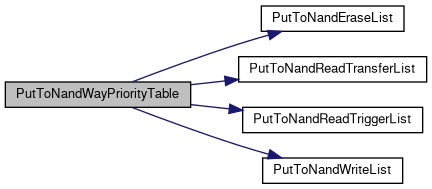

◆ PutToNandWriteList()
| void PutToNandWriteList | ( | unsigned int | chNo, |
| unsigned int | wayNo | ||
| ) |
Append the specified die to the tail of the write list of its channel.
Similar to PutToNandIdleList() but with different target list.
- Parameters
-
chNo the channel number of target die wayNo the way number of target die
Definition at line 733 of file request_schedule.c.

◆ SchedulingNandReq()
| void SchedulingNandReq | ( | ) |
Iteratively do schedule on each channel by calling SchedulingNandReqPerCh.
Definition at line 186 of file request_schedule.c.
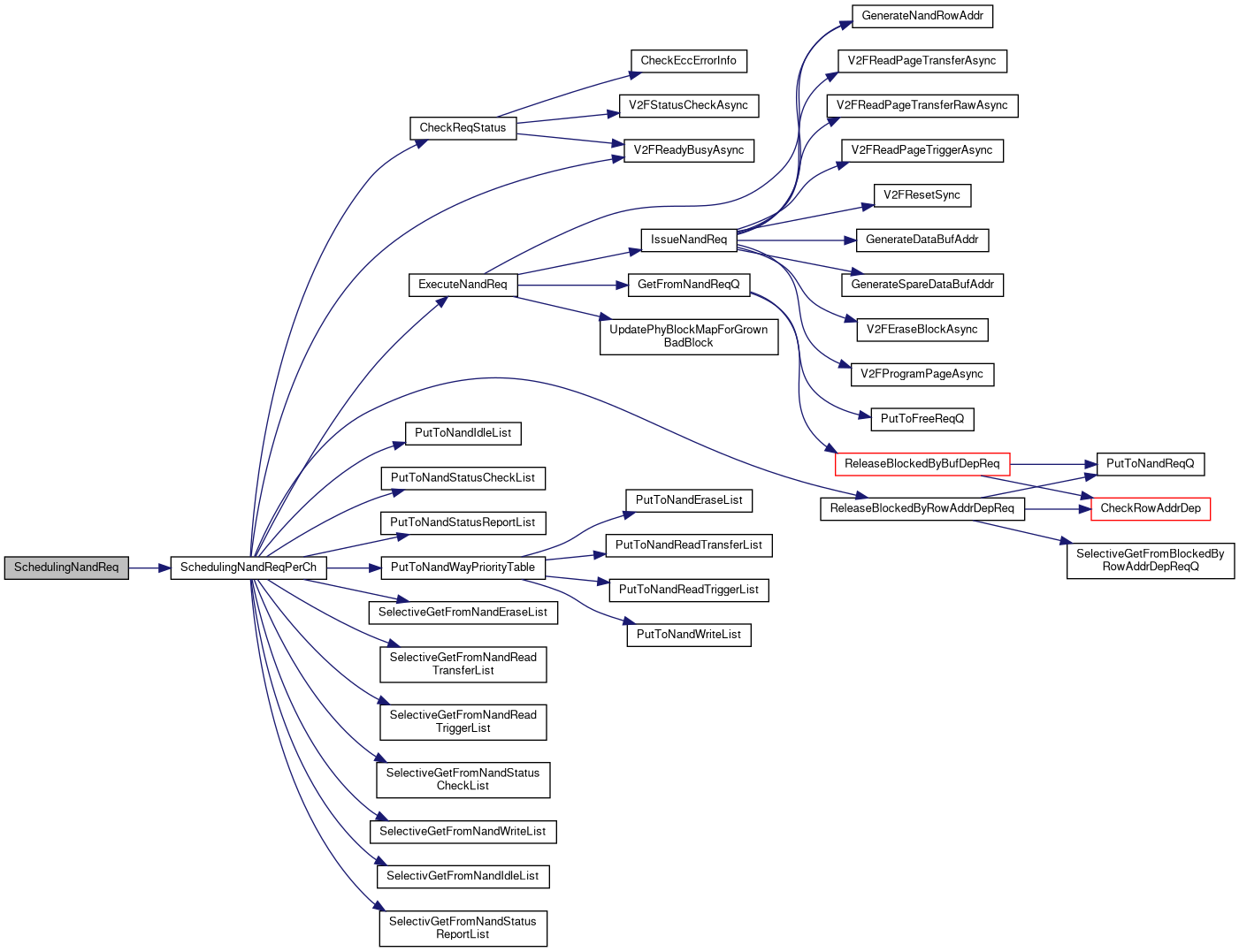
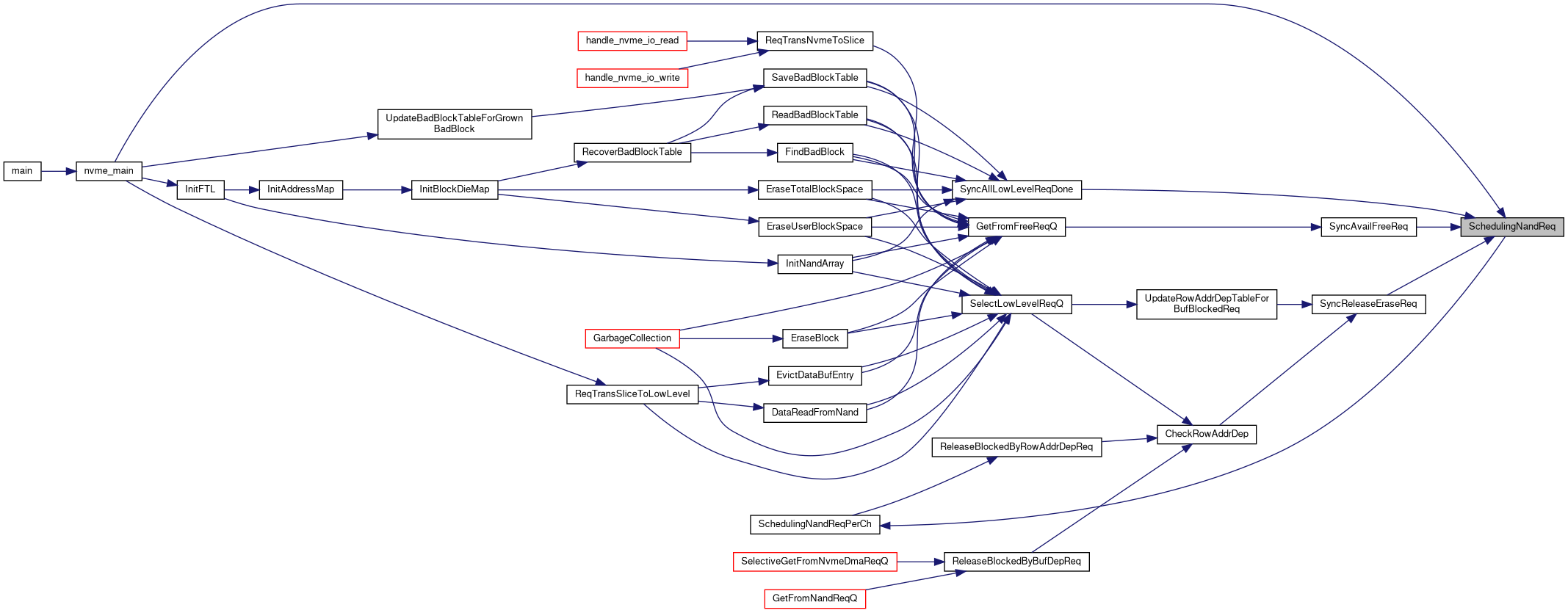
◆ SchedulingNandReqPerCh()
| void SchedulingNandReqPerCh | ( | unsigned int | chNo | ) |
The main function to schedule NAND requests on the specified channel.
This function can be separated into 3 parts:
- select idle ways which has requests want to execute
- update the request status of each way (second stage status check) and move the die to the idle list if the request is done.
- update some requests' status (first step status check) and issue requests based on the predefined flash operation priority.
Check the inline comments for more detailed explanation.
- Parameters
-
chNo the channel number for scheduling
Before doing scheduling on this channel, we should check if there is any idle way on this channel.
If there is any idle way in the idle list, we have to traverse the idle list, and try to schedule requests on the idle ways.
Currently no available requests should be executed on this way, but there may be some requests in the blockedByRowAddrDepReqQ instead. Try to release the blockedByRowAddrDepReqQ and check again if there are any requests to do later.
If any blocked request is released in ReleaseBlockedByRowAddrDepReq(), they will be added to the PutToNandReqQ.
If there is any request should be scheduled on this die, move this die from idle state list to the state list corresponding to the request type. Otherwise, there is really no request want to use this die, just skip this die.
The most important task of this part is to check the request status (second stage status check). Base on the request status, move to the die to the idle state list if its request is done, or back to statusCheck list (first stage status check, check next part for details) if its request not complete yet.
But beside this, we also move the dies that had completed their requests to the corresponding state list if there is any request should be scheduled on this die, just like what we did in the previous part, before issuing requests in next part.
Since the previous part had moved all idle ways to the state list corresponding to the head request of this die, this die must not in DIE_STATE_IDLE state.
Also, we had check the request state is not REQ_STATUS_RUNNING, thus the ExecuteNandReq() must bring the die to DIE_STATE_IDLE.
Since the die become idle, now we can try to schedule request on this die like what we just did in the previous part, if there is any request should be executed on this die.
- Note
- In current implementation, here is the only place to change the state a die to IDLE and put it into the idle state list.
If the status shows that this request not finish yet, and the flag reqStatusCheckOpt is set to REQ_STATUS_CHECK_OPT_CHECK, which means this request is not READ_TRANSFER since READ_TRANSFER use another flag REQ_STATUS_CHECK_OPT_COMPLETION_FLAG for checking, thus we have to move it back to the statusCheck list (first stage status check) for the next part to check it again.
Similar to next part, because the CheckReqStatus() will turn the flag reqStatusCheckOpt from REQ_STATUS_CHECK_OPT_REPORT to REQ_STATUS_CHECK_OPT_CHECK, we don't have to manually change the flag after/before the die was moved to the statusCheck list.
In the last part, we now can try to issue the requests based on the priority of flash operations. (check the paper)
- Note
- This part reflect the priority of flash operations mentioned in the paper, therefore DO NOT break the order of these 'if' conditions as long as there is no need to adjust the priority of flash operations.
If there is at least one request should be scheduled and their ways and the channel is not busy, we can issue the requests by calling ExecuteNandReq().
- Note
- Since some request may make the channel controller busy, we should skip the remaining requests right away as the channel become busy.
After the command is issued, we should move the die to the state list statusCheck or statusReport based on the request type:
For READ_TRIGGER, WRITE, ERASE requests:
These types of requests will be moved to the
statusChecklist as they were issued. And next time we entered this part, we will check the status of those requests first, since they are in thestatusChecklist and status check has the highest priority.To check the request status, we use the function
CheckReqStatus()to get the requests status of the ways and then move the die to thestatusReportlist.- Note
- the function
CheckReqStatus()will change the flagreqStatusCheckOpttoREQ_STATUS_CHECK_OPT_REPORT, therefore there is no need to modified the flag before/after we move the die to thestatusReportlist. -
Not all the requests' status can be retrieve since the die may be busy. Therefore, we only move the dies that successfully retrieved the status to the
statusReportfor second stage status checking.
For READ_TRANSFER requests:
This type of requests will be directly added to the
statusReportlist. in other words, the status of READ_TRANSFER requests will not be checked in this part.GUESS: The reason that we don't check the status of READ_TRANSFER requests may be this type of requests are supposed to be time consuming task, thus we have no need to check the status right after they just being issued.
- Warning
- here should second stage status check
Definition at line 211 of file request_schedule.c.
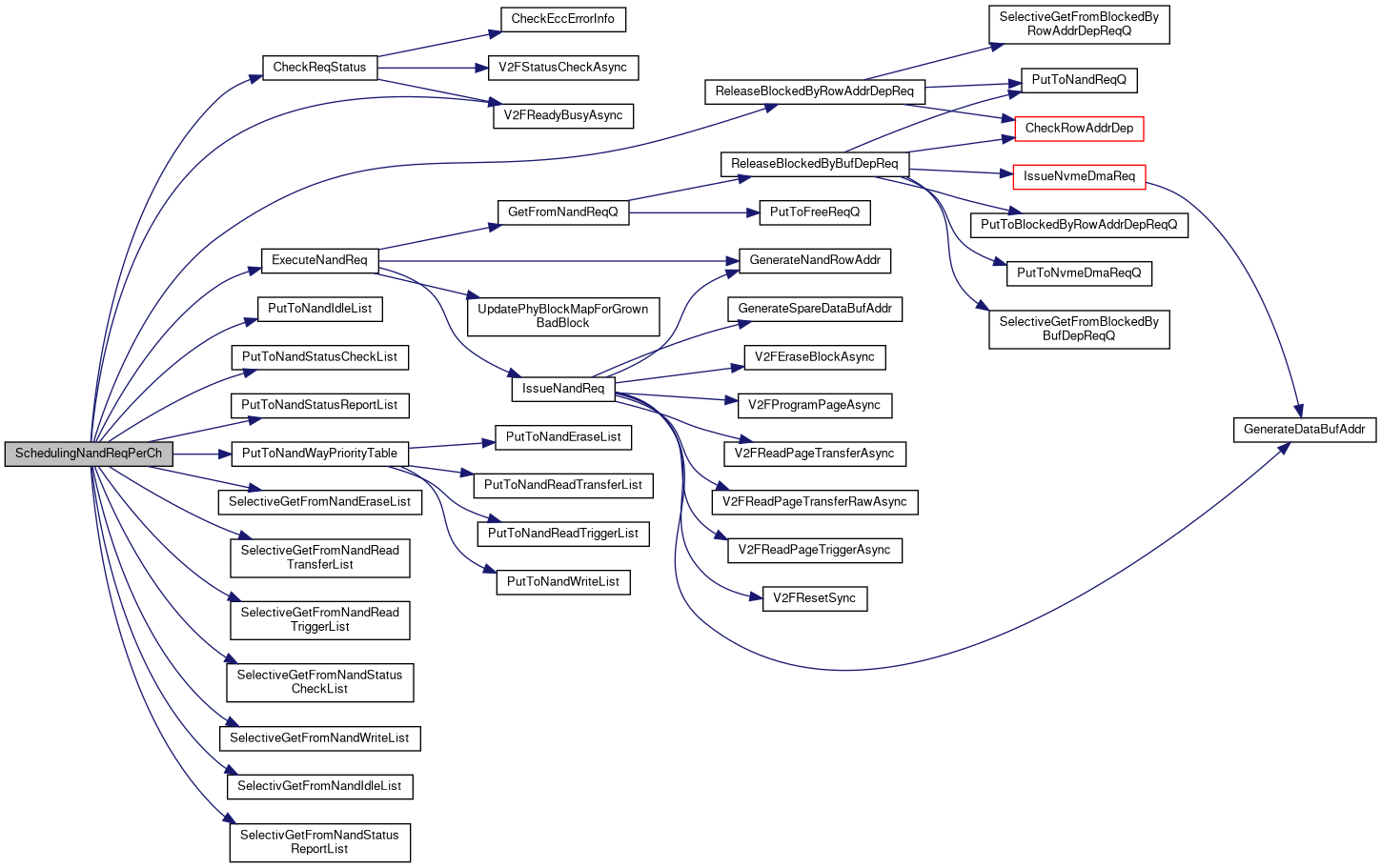
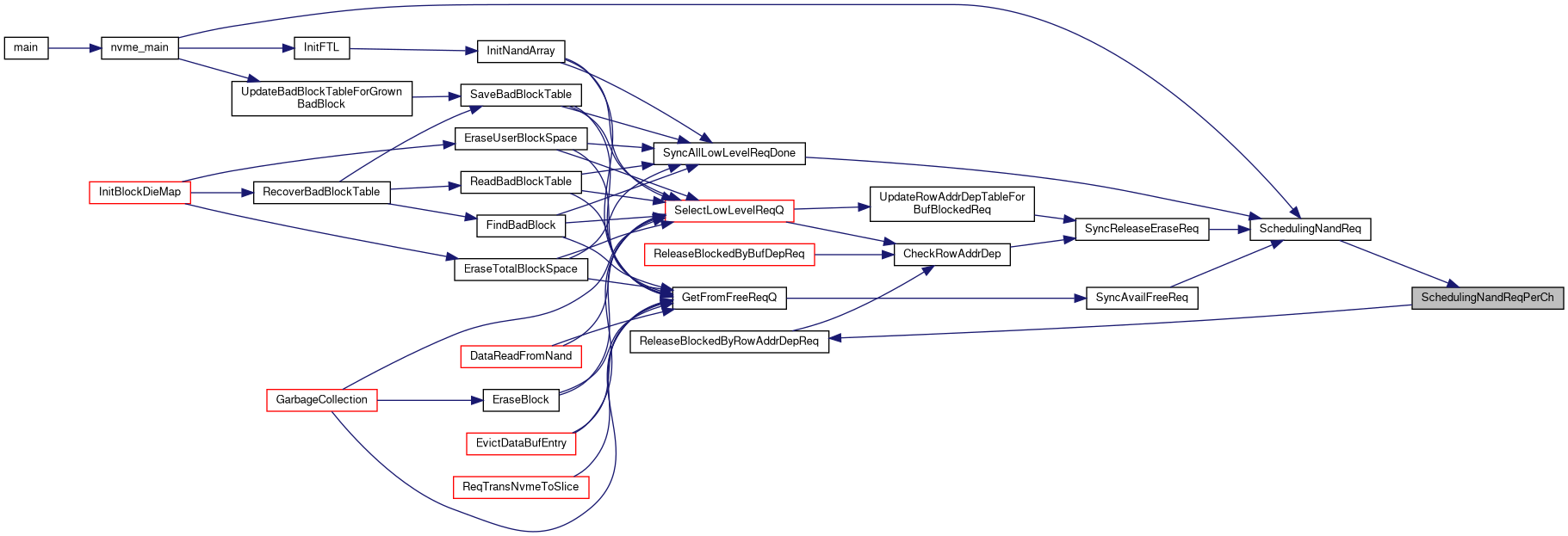
◆ SelectiveGetFromNandEraseList()
| void SelectiveGetFromNandEraseList | ( | unsigned int | chNo, |
| unsigned int | wayNo | ||
| ) |
Remove the specified die from the erase list of its channel.
Similar to SelectivGetFromNandIdleList(), but with different target list.
- Parameters
-
chNo the channel number of target die wayNo the way number of target die
Definition at line 885 of file request_schedule.c.

◆ SelectiveGetFromNandReadTransferList()
| void SelectiveGetFromNandReadTransferList | ( | unsigned int | chNo, |
| unsigned int | wayNo | ||
| ) |
Remove the specified die from the read transfer list of its channel.
Similar to SelectivGetFromNandIdleList(), but with different target list.
- Parameters
-
chNo the channel number of target die wayNo the way number of target die
Definition at line 822 of file request_schedule.c.

◆ SelectiveGetFromNandReadTriggerList()
| void SelectiveGetFromNandReadTriggerList | ( | unsigned int | chNo, |
| unsigned int | wayNo | ||
| ) |
Remove the specified die from the read trigger list of its channel.
Similar to SelectivGetFromNandIdleList(), but with different target list.
- Parameters
-
chNo the channel number of target die wayNo the way number of target die
Definition at line 696 of file request_schedule.c.

◆ SelectiveGetFromNandStatusCheckList()
| void SelectiveGetFromNandStatusCheckList | ( | unsigned int | chNo, |
| unsigned int | wayNo | ||
| ) |
Remove the specified die from the status check list of its channel.
Similar to SelectivGetFromNandIdleList(), but with different target list.
- Parameters
-
chNo the channel number of target die wayNo the way number of target die
Definition at line 948 of file request_schedule.c.

◆ SelectiveGetFromNandWriteList()
| void SelectiveGetFromNandWriteList | ( | unsigned int | chNo, |
| unsigned int | wayNo | ||
| ) |
Remove the specified die from the write list of its channel.
Similar to SelectivGetFromNandIdleList(), but with different target list.
- Parameters
-
chNo the channel number of target die wayNo the way number of target die
Definition at line 759 of file request_schedule.c.

◆ SelectivGetFromNandIdleList()
| void SelectivGetFromNandIdleList | ( | unsigned int | chNo, |
| unsigned int | wayNo | ||
| ) |
Remove the specified die from the idle list of its channel.
Since the state lists only records the index of head/tail way in their list, there is no need to modify the wayPriority if the target way is at the body of its idle list.
- Note
- Like
PutToNandIdleList(), this function won't changereqStatusCheckOptanddieStatetoo.
- Warning
- function name typo
- Parameters
-
chNo the channel number of target die wayNo the way number of target die
Definition at line 568 of file request_schedule.c.

◆ SelectivGetFromNandStatusReportList()
| void SelectivGetFromNandStatusReportList | ( | unsigned int | chNo, |
| unsigned int | wayNo | ||
| ) |
Remove the specified die from the status report list of its channel.
Similar to SelectivGetFromNandIdleList(), but with different target list.
- Warning
- function name typo
- Parameters
-
chNo the channel number of target die wayNo the way number of target die
Definition at line 633 of file request_schedule.c.

◆ SyncAllLowLevelReqDone()
| void SyncAllLowLevelReqDone | ( | ) |
Do schedule until all the requests are done.
As mentioned in the paper, the NVMe requests have higher priority than NAND requests. Therefore the function that handles NVMe request CheckDoneNvmeDmaReq() should be called before the function for scheduling NAND requests SchedulingNandReq().
Definition at line 135 of file request_schedule.c.


◆ SyncAvailFreeReq()
| void SyncAvailFreeReq | ( | ) |
Try release request entries by doing scheduling (both NVMe and NAND).
Similar to SyncAllLowLevelReqDone(), but this function will stop at there is at least one free request entry exists.
Definition at line 150 of file request_schedule.c.

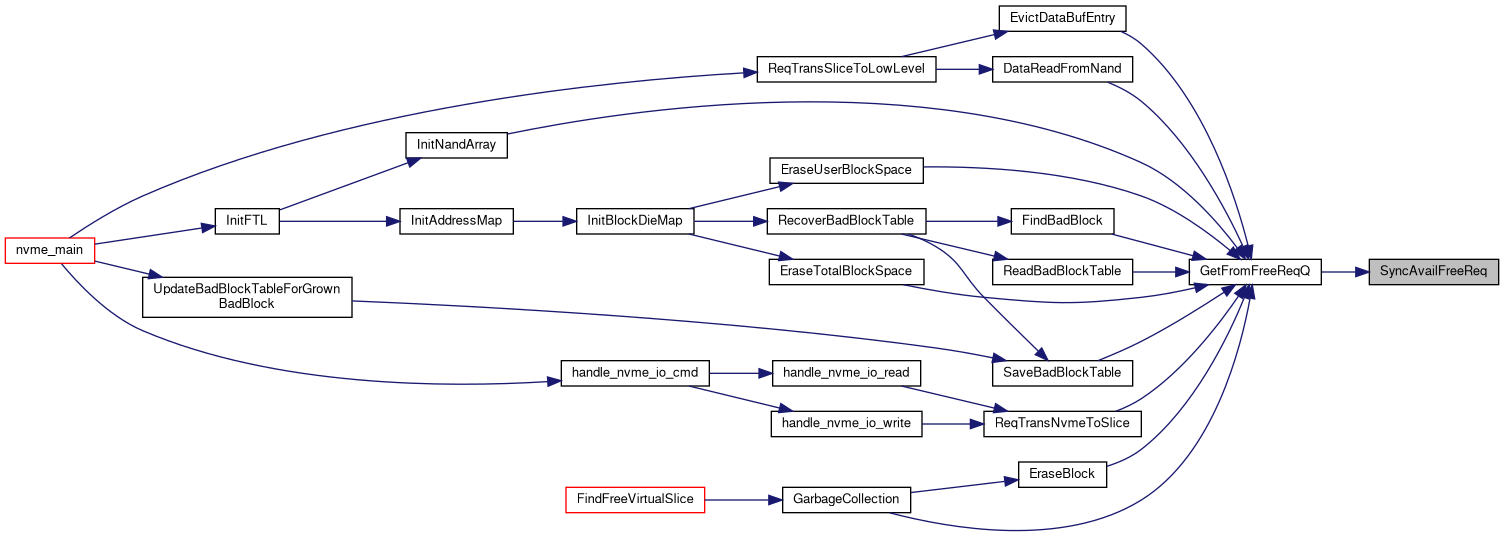
◆ SyncReleaseEraseReq()
| void SyncReleaseEraseReq | ( | unsigned int | chNo, |
| unsigned int | wayNo, | ||
| unsigned int | blockNo | ||
| ) |
Issuing requests until the specified block can be erased.
Sometimes, a request on a block may be blocked by the previous erase request on the same block. However, the erase request may also blocked by the previous read requests.
So, this function will try to release the pending requests on the specified block that is blocked by the pending erase request.
- Parameters
-
chNo The channel number of the target block. wayNo The way number of the target channel. blockNo The block number of the target die.
Definition at line 174 of file request_schedule.c.
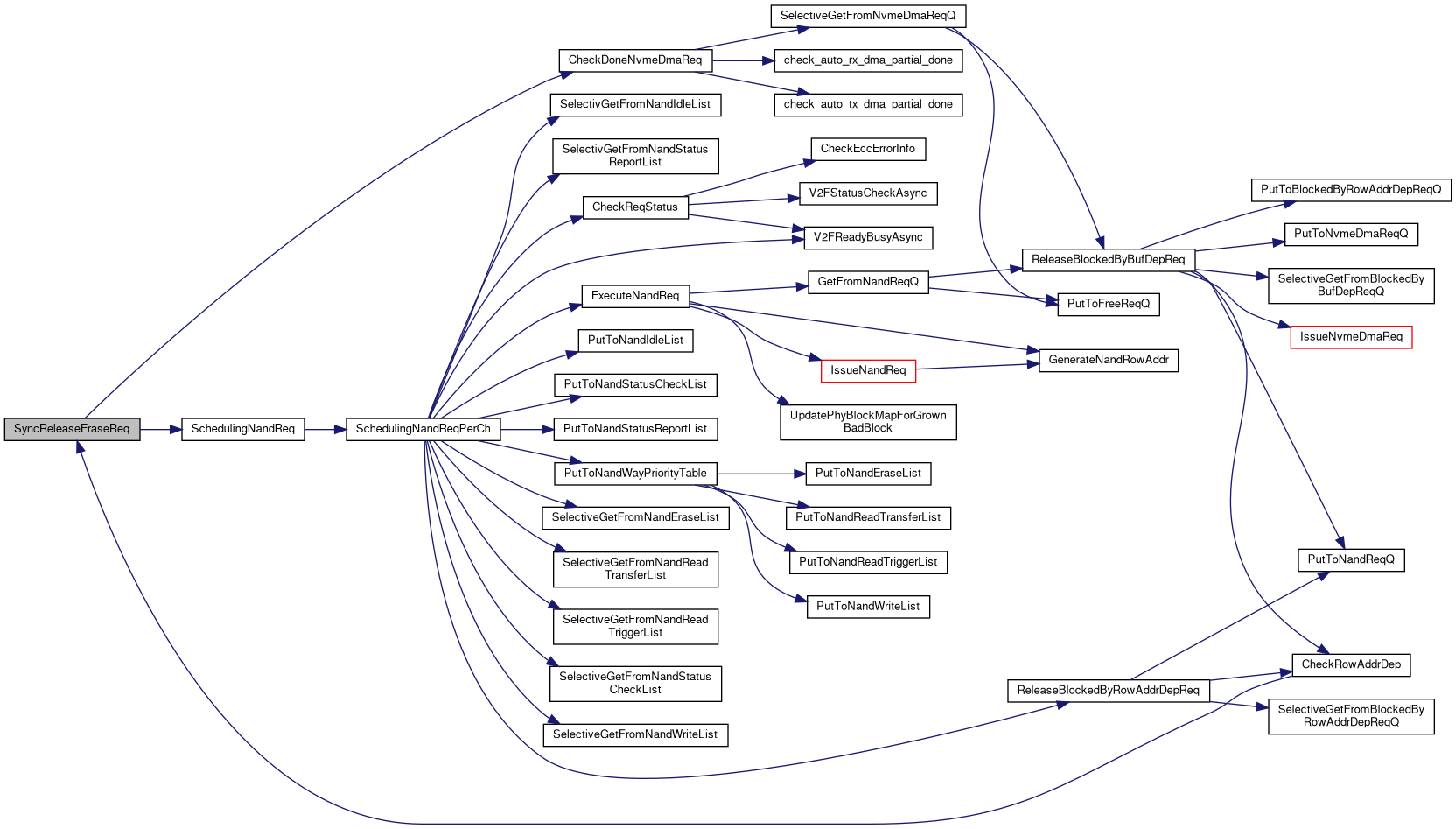
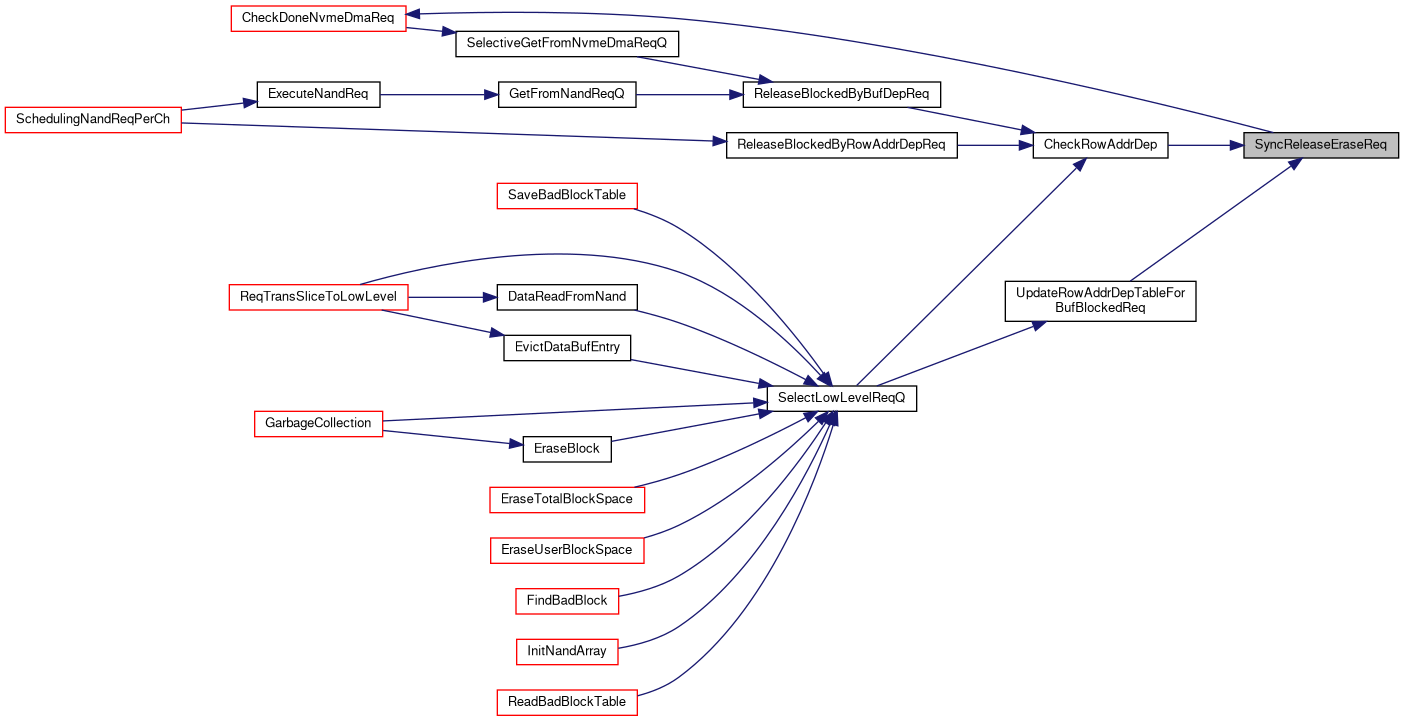
Variable Documentation
◆ completeFlagTablePtr
|
extern |
Definition at line 54 of file request_schedule.c.
◆ dieStatusTablePtr
|
extern |
◆ eccErrorInfoTablePtr
|
extern |
Definition at line 56 of file request_schedule.c.
◆ retryLimitTablePtr
|
extern |
Definition at line 57 of file request_schedule.c.
◆ statusReportTablePtr
|
extern |
Definition at line 55 of file request_schedule.c.
◆ wayPriorityTablePtr
|
extern |
Definition at line 60 of file request_schedule.c.